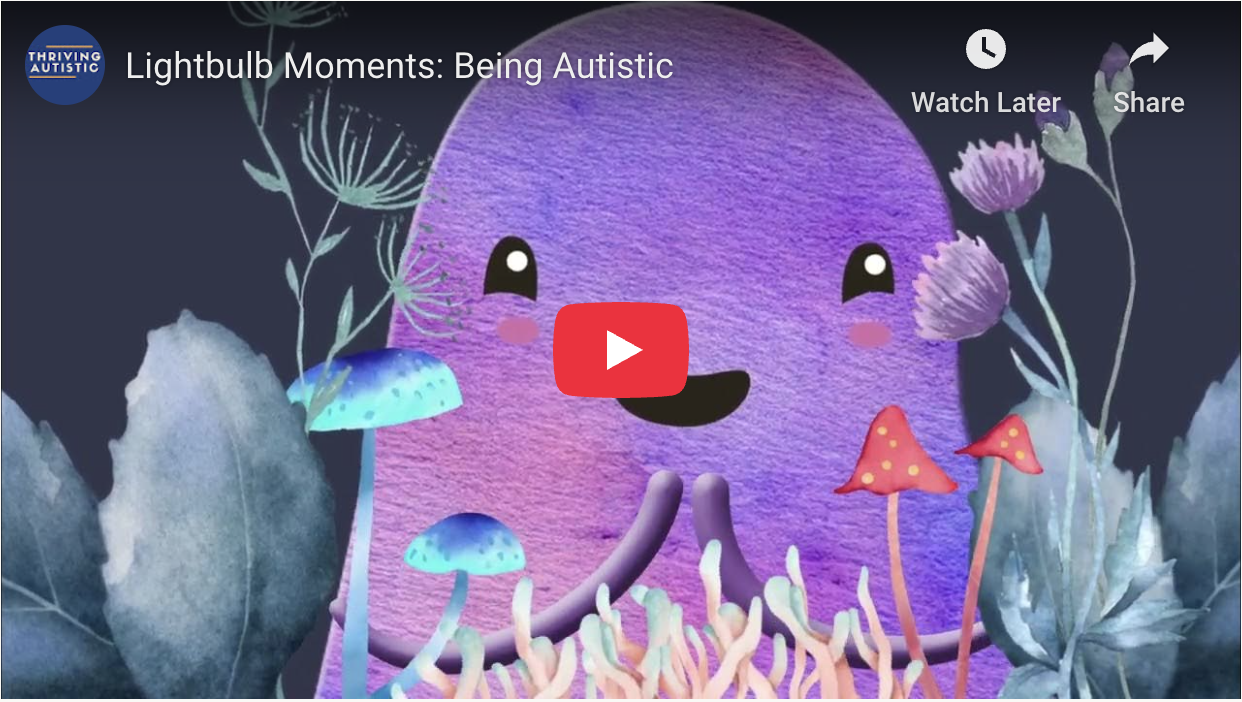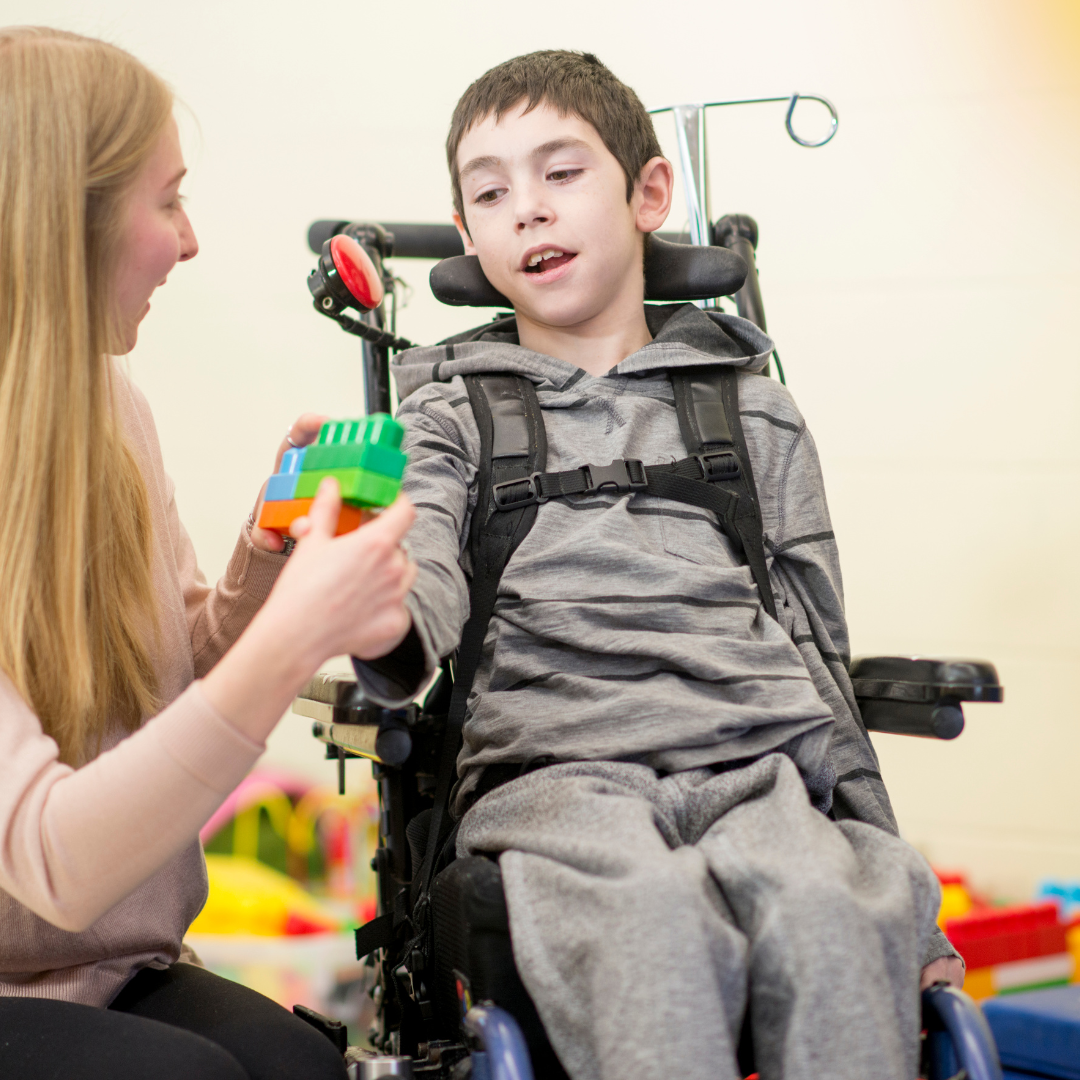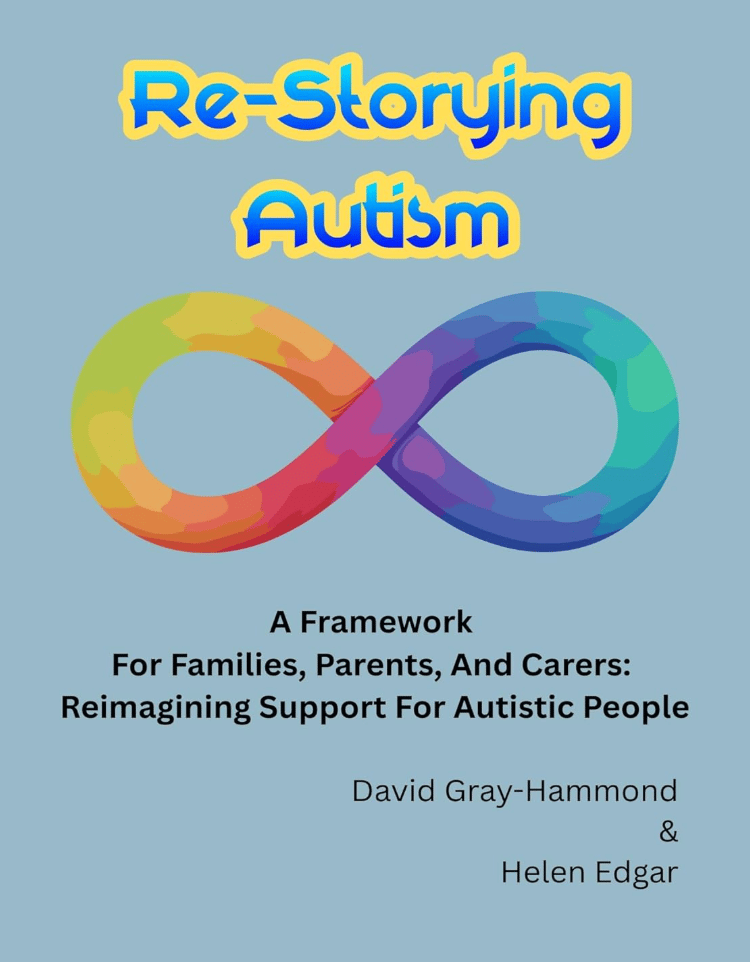I am delighted to work with Thriving Autistic as their Community and Communications Lead. Last week at our Discovery Celebration: Autistic Community Shaping Neuro-Affirmative Support (18.09.2025) event, we shared our Evaluation Report which showed the amazing impact of our Discovery Programme for Autistic adults. I was also delighted to finally share the two new neuro-affirming educational animation films which I have been working on with our team over the past year.
Exploring Autistic Experiences Through Animation
✨ Discovering You’re Autistic – exploring the strengths and possibilities that come with understanding yourself and finding belonging.
✨ Lightbulb Moments: Being Autistic – shining a light on the many ways Autistic people experience and make sense of the world, showing these experiences as both shared and valuable.
These animations are more than films, they are invitations to recognise your Autistic ways of being in affirming ways, to re-story your life, and to see Autistic experiences reflected with respect and care. The videos are also valuable tools for non-Autistic professionals to deepen their understanding, for families to explore together, and for Autistic people to feel seen and better understood.
Our animations were proudly created by a neurodiverse, international team, with all of our writers being Autistic:
Developed by our team of Autistic writers and creative people:
Laura Buckland Mason
Jessica K Doyle
Helen Edgar
Sonny Hallett
Fergus Murray
Animation, Music and Audio
lara Abigalil: Animation and Art Director
Somebody Someone (AKA Aubrey Hays): Composer and Musician
Paulo Beto – Vocal Treatment & Mixing
Produced by
Tara O’Donnell-Killen, Thriving Autistic CLG
Our work was collaborative and community-rooted. Each animation is paired with two companion blogs: one written for the Autistic community, and one for non-Autistic professionals who want to better understand and support Autistic people. Together, they reflect our core belief that Autistic people need to lead conversations about Autistic experiences.
I joined the panel discussion for our Discovery Celebration: Autistic Community Shaping Neuro-Affirmative Support (18.09.2025) with Fergus Murray who was also part of the animations team. The event was hosted by Tara O’Donnell-Killen, founder and CEO of Thriving Autistic. The text below has been adapted from the script I shared during the event.
Shaping the Animations
Question: These animations balance both the challenges and the strengths of discovering you’re Autistic. How did you decide on the themes and concepts for the animations?
We thought carefully about what these films should hold. All of us on the writing team are late-identified Autistic, and we were drawing not just on our own personal and professional journeys but also on a wealth of community knowledge and Autistic-led academic research. From my own experience of supporting the facilitation of the Discovery Programme over the past year and listening to the many shared experiences and stories from people in various online spaces, we started to notice strong themes and patterns and they really shaped the focus of the animations. Myself, Laura Buckland Mason, Sonny Hallett and Fergus Murray worked on the scripts together over many iterations trying to get them to capture the authenticity of Autistic lived experience in all its nuance, while making it accessible to a broad audience.
Our character was first brought to life by Sonny Hallett and then beautifully developed through the animations by Iara Abigalil. Jessica K Doyle, working closely with Somebody Someone, added another layer of richness, giving the animations depth and warmth through voice, sounds, and music. We really wanted the animations to feel relatable and accessible to people from all walks of life, which is why we chose soft, irregularly shaped, colourful characters with no identifiable gender or cultural markers. We reflected experiences through sound, shape, and colour so the animation could speak across intersections, whether to Autistic people recognising aspects in themselves, or to non-Autistic people wanting to understand what it may be like to be Autistic. That sense of openness was really important for us to get across, as there is no single way to be Autistic.
One of the most common themes that comes up when people begin self-identifying as Autistic, or seeking an assessment, is the feeling of struggling or being somehow different from the majority of people around them. Unfortunately, the first messages people often encounter about autism are still overwhelmingly negative.
Too often, Autistic people are still described only in terms of what we lack, with traits presented as problems to be “fixed.” That framing is really harmful for our wellbeing and offers no constructive path forward. We wanted to help change that, by giving a strength based neuro-affirmative framing in our animations.
In the animations, we aimed to strike a balance about being honest about the challenges and the impact of things such as masking, the double empathy problem, and unsupportive sensory environments, whilst also highlighting Autistic strengths, joy, and creativity and the unique perspectives we all have. When our differences are validated with others it can help create a real sense of belonging which is something I really value from being part of the Autistic community.
I have found that one of the strongest reccuring themes to come through in the Discovery Programme and other Autistic and neurodivergent spaces I am part of is often the emotional weight of initially discovering you’re Autistic. For many of us, especially when we are identified later in life, it can feel really overwhelming, it is as if you have to re-story your whole life through a new lens. And yet, at the same time, there can be a deep relief in finally having a name for your experiences – realising you are Actually Autistic. That recognition can be a real turning point, “it’s a clue to finding others who are on your wavelength, and to learn from shared experiences” (quote from animation).
The concepts we chose were very much rooted in lived experience, community stories, and also grounded in research. With our films Discovering You’re Autistic and Autistic Lightbulb Moments: Being Autistic, our aim was to give people reassurance, encouragement, and hope, alongside an invitation to the many supportive community spaces that are out there like Thriving Autistic.
Being Autistic in a world not designed for us isn’t easy, but it can also be a profound source of pride and joy when you are connected to the wider community. That is something we want everyone who discovers they are Autistic to have the chance to experience and find out about.
Why Community and Connection Matter
Question: What do you hope people take away from these animations about the value of Autistic community, connection, and the importance of trusting and validating our own inner experiences?
Realising you are Autistic and connecting with others can bring clarity, self-acceptance, and new ways to navigate life. In every Discovery workshop, people share the same kind of relief, that moment of being understood, sometimes for the very first time.
Too often, Autistic people are told, or we feel we have to measure ourselves against neuronormative ideals. Society is innately ableist and life can be very hard, many of us learn to doubt our own inner experience very early on in life. You can lose your authentic sense of self. We mask, we perform, we suppress our needs to fit in, often at a huge cost to our well being and often without even realising why……. until we discover we are Autistic. When you discover you are Autistic that is often when things start to connect and make a bit more sense for many people.
The animations were designed to gently counter pathological framing, by showing that our Autistic ways of thinking, feeling, perceiving and expressing ourselves are valid. Autistic people don’t need fixing; we need understanding, support, and safe spaces where our experiences are trusted and safe community space offers that.
As our Discovery Report has shown, it is why the Discovery Programme and our network and Directory of Neuro-affirming Neurodivergent Practitioners is so important for people as it offers that validation and sense of belonging that many have not experienced before.
Finding common ground with others can transform how we see ourselves. Things once framed as personal failings can be re-understood as Autistic traits – different, but not less. This opens the door to thriving, not just surviving.
Research now shows that developing a positive Autistic identity and having access to affirming community support directly improves wellbeing. Autistic-led spaces create opportunities for healing and solidarity, especially for those who have long felt marginalised or stigmatised.
These animations are about that transformation: connection, story-sharing, and building community. They remind us that neurological differences are natural and valuable forms of human diversity.
Discovery, Belonging, and the Bigger Picture
Neuro-affirmative practice is at the heart of Thriving Autistic’s Discovery Programme. The programme is not about diagnosis or labels, it is about recognition, validation, and belonging and echoes Thriving Autistic’s solidarity statement standing for safety, dignity and freedom.
The Discovery Evaluation Report shows just how powerful neuro-affirming practice can be. People often finish our programme with more self-awareness, greater acceptance, and better practical strategies for living in a world that often misunderstands them. For many, it is the first step into wider Autistic community and having a stronger sense of identity where they can self advocate and gain a better sense of well being.
Our animations are part of this bigger picture, nurturing positive Autistic identity, offering insight to non-Autistic professionals, and showing that belonging is possible for everyone.
A Personal Reflection
When you find a point of connection with others, whether through watching an animation like this or by being in a community space you begin to feel understood. You realise you’re not broken; you’re different, and those differences are ones many others share too.
Strength-based, Autistic-led spaces offer an opportunity for solidarity and healing which is so essential when you may have spent much of your life feeling misunderstood or on the margins.
We hope that people will take away and understand that that there is real strength in discovering you’re Autistic through a neuro-affirming lens and by reaching out to others who may ‘get it too’. These animations are about opening the door to connection, to sharing stories, building community, and creating safe spaces where our experiences, the joys and strengths as well as the difficulties are recognised and understood rather than judged.
Having neuro-affirming, Autistic-led work out in the community can bring people together. It adds to the growing narrative and the wider neurodiversity paradigm shift, reminding us that neurological differences are natural and valuable forms of human diversity. We hope our animations can play a small part in building this wider foundation of neuro-affirming practice, supporting those who are curious about what it means to be Autistic, while also giving non-Autistic people meaningful insight into our inner Autistic experiences.
Our aim is to nurture a positive Autistic identity, one rooted not in shame but in pride and joy, and to offer a sense of hope and belonging through community, solidarity, and connection. We hope you enjoy the films!
Explore More
🌱 Read the Discovery Evaluation Report
🌱 Find out more about the Discovery Programme
🌱 Watch the animations & read the blogs
🌱 Explore the Directory of Neuro-affirming Neurodivergent Practitioners
🌱 Read Ayhan Alman’s blog: I Thought It Was Just Me














